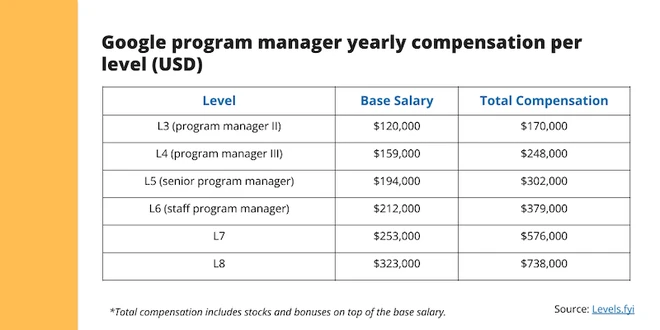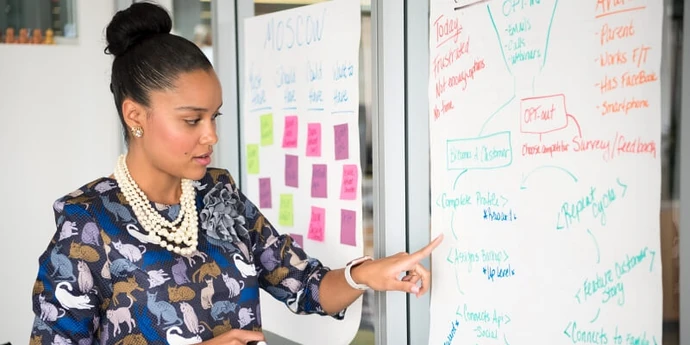Program manager interviews at Google are challenging. The questions are difficult, specific to Google, and cover a wide range of topics that are relevant to an important managerial role.
The good news is that the right preparation can make a big difference and help you land the job at Google. We’ve put together the ultimate guide to help you maximize your chances of success.
Here's an overview of what we'll cover in this guide:
- Role and salary
- Process and timeline
- Example interview questions
- Improve your interviewing skills
- Preparation plan
Click here to practice 1-on-1 with Google program manager ex-interviewers
1. Role and salary ↑
1.1 What does a Google program manager do?
In a nutshell, Google program managers are responsible for driving large-scale, cross-functional initiatives that are not necessarily technical in nature.
Unlike technical program managers (TPMs) who tend to focus on engineering-related execution, Google program managers work more broadly across business, operations, product, and strategy.
As a Google program manager, you’ll often work on:
- Launching go-to-market strategies
- Rolling out cross-functional organizational changes
- Managing large-scale operations and business processes
- Coordinating regulatory or compliance initiatives
- Overseeing global service rollouts
To ensure these programs are executed successfully, program managers collaborate with a wide range of teams, including marketing, sales, legal, finance, support, and product.
As a Google program manager, you are not expected to write code or manage technical architecture. Instead, your focus is on program delivery, stakeholder alignment, and long-term impact.
The core responsibilities of a Google program manager typically include:
- Defining program scope, timelines, and success metrics
- Creating project plans and tracking milestones
- Managing risks, dependencies, and resource allocation
- Driving alignment across multiple stakeholders
- Communicating progress and updates to leadership
While product managers decide what to build and TPMs manage how it’s built, program managers are responsible for making sure all involved teams are aligned and ready to scale, support, and complete the project.
In short, the Google program manager role is about execution, coordination, and impact.
1.2 Salary and compensation
Google offers competitive total compensation packages for program managers. The total compensation typically includes a base salary, annual bonus, and equity in the form of restricted stock units (RSUs).
As usual, compensation can vary depending on level, team, and location.
Below is a breakdown of the compensation typically offered to Google program managers, based on verified user-submitted data from Levels.fyi.

Google program managers in higher-cost locations, such as San Francisco or New York, typically earn more due to location-based costs of living.
If you’re actively interviewing for a Google program manager role, ask your recruiter which level you're being considered for. This will help you understand what you should expect in terms of compensation.
And remember, compensation packages are always negotiable, even at Google. So, if you do get an offer, don’t be afraid to ask for more. If you need help negotiating, read our guide to Google job offer negotiations and consider booking one of our salary negotiation coaches to get expert advice.
2. Google program manager interview process and timeline ↑
2.1 What interviews to expect
Google's interview process for the program manager role is extensive and can be quite time-consuming. It typically takes 3-8 weeks to go through the process, but it's not uncommon for it to take much longer (i.e., over 6 months).
Here's an overview of the interview steps you'll face along the way.
- Resume screen
- Recruiter screen (1 interview)
- Program manager screen (1-2 interviews)
- Onsite interviews (typically 4 rounds)
In addition to these interview steps, some behind-the-scenes steps have to happen before you get an offer, which we talk about later in Section 2.3.
But first, let's focus on the steps you'll need to prepare for:
2.1.1 Resume screen
First, recruiters will look at your resume and assess if your experience matches the open position. This is the most competitive step in the process, as millions of candidates will not even make it past this stage.
You can refer to this free program manager resume guide and browse these Google resume examples to help tailor your resume to the program manager role you’re targeting.
And if you’re looking for expert feedback, you can also get input from our team of ex-Google recruiters, who will teach you what achievements to focus on (or ignore), how to fine-tune your bullet points, and more.
If possible, it can also be helpful to get an employee or contact at Google to refer you to the recruiting team internally. An internal referral won’t guarantee an interview, but it can increase your chances of being seen and considered by their recruiters.
2.1.2 Recruiter screen
After your application is accepted, you'll start your interview process with Google with a recruiter call. They are looking to confirm that you've got a chance of getting the job at all, so be prepared to explain your background and why you’re a good fit for Google. You should expect typical behavioral and resume questions like "Tell me about yourself", "Why Google?", etc.
If you get past this first HR screen, the recruiter will then help schedule your first program manager interview. At this time, your recruiter will probably also give you additional details about the next interview and the person you're interviewing with.
2.1.3 Program manager screen (1-2 interviews)
Next, you'll go through one or two program manager interviews. Your first interviewer will usually be the hiring manager for the role, and sometimes you'll also have a second interview before you're advanced to the onsite interviews.
The types of questions you'll be asked in this round are similar to the questions you'll encounter in your onsite interviews. In particular, you'll want to be well-prepared for leadership and program management questions. More on this in the example questions section.
The role of this step is to make sure it's worth bringing you onsite. Your interviewer’s goal here is to make sure you’ve got skills in all the right areas and actually have a chance of meeting the hiring bar.
2.1.4 Onsite interviews
Onsite interviews are the real test. You'll typically spend a full day interviewing with Google, and the interview questions you'll encounter will usually fall into one of three broad categories:
- Googleyness/leadership questions, where you'll be evaluated on your past work experience, your motivation for applying, your ability to handle conflict, cultural fit, and more.
- General cognitive ability (GCA) questions, which test your ability to think critically and assess how you approach problem-solving. Questions are open-ended and typically ask how you would behave or respond to a certain scenario, be it hypothetical or something you may have encountered in the past.
- Program management questions, where you'll be asked about leading projects, working with cross-functional teams, executing at various stages of the project lifecycle, and other experiences specific to the role or functional area that you're applying for. They may probe at some technical knowledge specific to the role, such as metrics.
Your onsite interviews will likely be held virtually, which has been the case since the COVID-19 pandemic.
However, if you live near a Google HQ, you may be invited for in-person interviews. If you are invited, you may also be given the chance to have lunch or coffee with a fellow program manager. This is meant to be your time to ask questions about what it's like to work at Google. (The company won't be evaluating you during this time, but we recommend that you behave as if they were.)
In some cases, Google may ask you to do a follow-up interview after your onsite to drill you further on one of the areas we listed above. This means you're close to getting an offer, but the company wants to double-check that you're meeting the hiring bar for a given criteria.
2.2 What exactly is Google looking for?
At the end of each interview, your interviewer will grade your performance using a standardized feedback form that summarizes the attributes Google looks for in a candidate. The form is constantly evolving, but below we have listed the main components we know of at the time of writing this article.
A) Questions asked
In the first section of the form, the interviewer fills in the questions they asked you. These questions are then shared with your future interviewers so you don't get asked the same questions twice.
B) Attribute scoring
Each interviewer will assess you on the four main attributes Google looks for when hiring:
- General cognitive ability. This is often referred to as "GCA" by Googlers. The company wants to hire smart program managers who can learn and adapt to new situations. Here your interviewer will try to understand how you solve hard problems and how you learn. For more information, take a look at our guide to the GCA interview.
- Role-related knowledge and experience. This is often referred to as "RRK" or "RRKE" internally. The company wants to make sure that you have the right experience, domain expertise, and competencies for the position you're applying for. For more information, take a look at our guide to the RRK interview.
- Leadership. Google looks for a particular type of leadership called “emergent leadership.” You'll typically be working in cross-functional teams at Google, and different team members are expected to step up and lead at different times in the lifecycle of a project when their skills are needed. More information in this guide to Google leadership questions.
- Googleyness (i.e. culture fit). The company wants to make sure Google is the right environment for you. Your interviewer will check whether you naturally exhibit the company's values, including: being comfortable with ambiguity, having a bias to action, and a collaborative nature. More information in this guide to Googleyness.
Depending on the exact job you're applying for, these attributes might be broken down further. For instance, if you were applying to be a TPM, then "role-related knowledge and experience" might be broken down into "program management" and "technical judgment".
In this middle section, Google's interviewers typically document your answers in detail and give you a score for each attribute (e.g., "Poor", "Mixed", "Good", "Excellent").
C) Final recommendation
Finally, interviewers will write a summary of your performance and provide an overall recommendation on whether they think Google should be hiring you or not (e.g., "Strong no hire", "No hire", "Leaning no hire", "Leaning hire", "Hire", "Strong hire").
2.3 What happens behind the scenes
If things go well at your onsite interviews, here's what the final steps of the process look like:
- Interviewers submit feedback
- Hiring committee recommendation
- Team matching
- Senior leader and compensation committee review
- Final executive review (only senior roles)
- You get an offer
After your onsite, your interviewers will all submit their feedback, usually within two to three days. This feedback will then be reviewed by a hiring committee, along with your resume, internal referrals, and any past work you have submitted. At this stage, the hiring committee will make a recommendation on whether Google should hire you or not.
If the hiring committee recommends that you get hired, you'll usually start your team-matching process. In other words, you'll talk to hiring managers and one or several of them will need to be willing to take you on their team for you to get an offer from the company.
In parallel, the hiring committee recommendation will be reviewed and validated by a senior manager and a compensation committee who will decide how much money you are offered. Finally, if you are interviewing for a senior role, a senior Google executive will review a summary of your candidacy and compensation before the offer is sent to you.
As you've probably gathered by now, Google goes to great lengths to avoid hiring the wrong candidates. This hiring process, with multiple levels of validations, helps them scale their teams while maintaining a high caliber of employees. But it also means that the typical process can spread over multiple months.
3. Google program manager example interview questions ↑
To help you prepare strategically for your interviews, we’ve used Glassdoor data to identify the types of questions most frequently asked in Google program manager interviews.
Let's dive in and look at the three broad types of interview questions you can expect:
- Googleyness/leadership questions
- GCA (general cognitive ability) questions
- Product management questions
3.1 Googleyness/leadership questions
Google program managers usually work in cross-functional teams with other engineers, product managers, PMMs, data analysts, etc. You’ll need to be able to communicate clearly, work with others efficiently, build trust and manage relationships, and resolve project issues (before or after they arise).
Your ability to perform these functions will be assessed through 1) “Googleyness” questions (also known as cultural fit), and 2) leadership questions.
“Googleyness” questions ask about your general work background, your long-term career goals, and what you look for in a working environment. Your interviewer’s goal here is to determine your cultural fit, and to assess how your professional values align with the company’s. Be prepared to talk about your career trajectory, general working style, and your motivations for joining Google.
As for leadership questions, their purpose is to assess your leadership traits, which are crucial to any type of managerial role. They often come in the form of behavioral questions that probe into how you’ve behaved in past work situations, as a predictor for future behavior. Be prepared to talk about your accomplishments, management style, and previous leadership experiences.
Here’s a list of example Googleyness and leadership questions reported by candidates on Glassdoor. Some phrasing has been lightly edited for grammar and clarity.
Example Googleyness & leadership questions asked at Google program manager interviews
Googleyness (cultural fit)
- Why should we hire you?
- What is your work style?
- What are your strengths and weaknesses?
- Why do you want to transfer to this role?
- Explain your career trajectory to date.
- Where do you see yourself in five years?
- Define your ideal work environment and manager.
- What does the motto "Google creates products for everyone" mean to you?
Leadership
- What do you look for in a team? As a new team member, how would you connect with your other team members?
- How do you work with people of all personalities?
- Tell me about a mistake you made in your current role. How did you manage the situation and learn from it?
For more in-depth guidance, read our prep guide for Googleyness and leadership interview questions.
3.2 GCA (general cognitive ability) questions
GCA (general cognitive ability) questions are standard at Google interviews. You’ll likely get at least one or two of them at some point in your interviewing process.
GCA questions are open-ended. They’re designed to test your reasoning, and assess how you approach and solve problems.
Here are some key points to remember about GCA questions:
- Open-ended questions: This means you’ll have to solve ambiguous problems, which may appear to have nothing to do with the position you’ve applied for.
- No single right way to answer: The questions may appear very broad and confusing at first, until you can break them down and show your reasoning.
- Data-driven decision-making: The key is to walk your interviewer through your thought process out loud, and to structure your response within a framework.
Here are some sample questions:
Example GCA questions asked at Google program manager interviews
- What is the first thing you would change about your company if you were made CEO today?
- How would you sell a singular product to a wide audience with varying needs?
- Pretend you are replacing all of X hardware in the company. How would you do that?
- If you were to increase an app's MAU by 5%, what would you do?
- Create a new product strategy, including milestones and goals. (On further probing: Consider the automobile industry—how would you market their product on YouTube?)
- How would you improve customer acquisition for a product? Pick an example and explain.
- Tell me about an inefficient product. What would you do about it?
- How would you set up support operations for Google Cloud?
- What 5 slides would you use for a presentation to a CEO?
- Present a business case on metric improvement.
- How many windows are in NYC?
Read this guide to dive deeper into Google’s GCA interviews.
3.3 Program management questions
Google program managers design and execute programs from end to end. It's therefore important that they have a strong ability to plan, prioritize, and deliver projects.
This is the part of the interview process where you need to show you think about programs comprehensively (e.g., resources, risks, vendors, etc.) and have a track record of executing flawlessly.
“Know the project lifecycle like the back of your hand. The PMBOK is a great place to start.” Nupur (former Google TPM)
To make a strong impression in this interview, you'll need to cover a lot of ground in your preparation. This is because the questions asked tend to vary based on the specific functional area you're applying for.
As a result, we'd suggest preparing for these four sub-categories, which all fall under program management questions:
3.1.1 Program management: Process & execution questions
Program managers are responsible for driving initiatives from planning to delivery, often across multiple teams, tools, and timelines.
That means interviewers will want to assess how well you manage operations and execution at scale. Expect questions that probe into your ability to define processes, track progress, handle dependencies, and course-correct when things go off track.
This category is key because it shows interviewers that you can design a program and, most importantly, actually deliver what needs to be done.
Example process & execution questions asked at Google program manager interviews
- Tell me about a time when you had to manage a program from start to finish.
- How would you streamline processes? Give examples.
- What's a risk that you've identified and dealt with in a project?
- What things would you consider when making a production plan?
- What would you do if you encountered a supply issue?
- What is a critical path and what happens if it changes?
- Describe the full process of shipping DG from A to B. What kind of docs are required?
- Imagine you're working on a project and learn something new midway that forces you to change course. How do you manage?
- Being from a non-tech background, it must be difficult to understand the technical aspect of a program — how do you deal with that?
- You have 12 months to roll out a new product. What is your vision for this program? Describe in detail how you would manage the process.
3.1.2 Program management: Prioritization questions
Google uses prioritization questions to evaluate your critical thinking and decision-making skills. This is a crucial area for program manager roles, as you’ll be working with a variety of teams and will often encounter conflicting priorities.
As a program manager, you’ll need to show that you can make the right calls. This often involves considering multiple scenarios, knowing how to identify and de-prioritize less urgent concerns, and making smart cross-functional decisions that serve both the organization and project goals.
Here are some sample questions you might be asked:
Example prioritization questions asked at Google program manager interviews
- Tell me about a time when you had to prioritize your needs over your engineering team's needs.
- How do you manage timelines in multiple projects? What is your approach if you see a timeline being pushed?
- Tell me about a time when you missed a deadline and what actions you took.
- You have 30 minutes with a VP — what topics do you cover?
- How would you allocate a product to customers when there's a limited supply?
- Which map features would you prioritize in Maps? For example, how would you prioritize roads vs. POIs or indoor navigation?
Dive deeper into how to answer prioritization questions with this helpful guide.
3.1.3 Program management: Crisis management questions
As a program manager, your ability to stay calm under pressure and lead through uncertainty is critical. At a company as fast-moving and complex as Google, things don’t always go according to plan, but it’s your job to make sure things get back on the right track.
That’s why interviewers will test how you handle unexpected challenges. This can include managing last-minute changes, navigating sudden challenges that arise, or recovering from failures and blockages.
Strong answers here show that you can think clearly, act decisively, and keep programs on track even when things go wrong.
Here are a few sample questions:
Example crisis management questions asked at Google program manager interviews
-
What if Google Maps lost all data and there is no backup plan?
- Imagine YouTube doesn’t work. What would you do?
- Given a data breach on a project, how would you address the problem with the client?
3.1.4 Program management: Communication & team conflict
As we’ve already mentioned, the Google program manager role is a cross-functional role. To be an effective leader, you’re expected to be an expert communicator who can maintain positive morale, facilitate smooth coordination among teams, manage expectations, align goals, and mediate conflict.
Your interviewer will want to know how you handle such concerns by asking about your communication style and conflict-resolution skills.
Here are some sample questions you may encounter, as reported on Glassdoor:
Example communication & team conflict questions asked at Google program manager interviews
- How would you resolve conflict and ambiguity in a project?
- Imagine you're working with a lot of engineers — how would you approach communications?
- Give an example of when you have had to explain a complex issue that is often misunderstood.
- Have you ever come across a low-performing resource in a project? How did you deal with the situation?
- If there was a critical need for a team member to work on Saturday during his/her off time, how would you manage the request as their indirect manager?
3.1.5 Program management: Metrics questions
Metric interview questions test if candidates can perform data analysis and select key metrics that matter most to the success of a product. Big Tech companies like Google use these questions to evaluate your analytical thinking and communication skills.
While metrics questions may not make up the majority of your Google program manager interviews, knowing how to harness data to make more impactful decisions is crucial to the role. So, don’t overlook the importance of these!
Here are a few sample metrics questions reported by candidates on Glassdoor:
Example program management metrics management questions
-
How do you measure success?
-
Tell me about a time you used data to make decisions. Give examples.
For more tips on metrics questions, check out this guide on the best ways to answer metrics-related interview questions, including answer frameworks you can apply.
You can also dive deeper into program management interviews by reading our program management primer for tech interviews.
4. Improve your interviewing skills ↑
Plenty of candidates are excellent at their jobs, but still end up failing their Google program manager interview. Why? Their interview skills are simply not up to par, especially for a company as competitive and prestigious as Google.
Here are some tips to keep in mind when preparing for your Google interview:
4.1 Don’t jump straight to answering
Answering a question right away may seem like a great way to show your confidence and knowledge, but it can be a huge red flag to interviewers.
It shows them that you: 1) haven’t taken the time to pause and truly think about your answer, 2) haven’t bothered to ask clarifying questions or discuss possible approaches, and 3) are not being collaborative with your interviewer.
All three are bad signs for how you may work within teams, especially for a cross-functional program manager role. For Google interviewers, your collaboration and communication skills are crucial.
Instead, take a moment to think before you respond. It’s okay to pause or jot down notes, as long as you let the interviewer know that’s what you’re doing.
Example:
- Question: “Can you tell me about a time you had to disappoint your supervisor?”
- Response: “That’s a great question - give me just a minute to collect my thoughts.”
This helps by:
- Giving you time to consider and structure your response
- Signaling that you are thoughtful in your communications, even in an interview setting
In program management interviews, you can start by discussing your approach before you start drawing up solutions. For example, outline your plan and show your thought process to the interviewer.
In leadership interviews, if you’re asked about previous work experiences and have several scenarios to share, you might want to ask your interviewer which story they prefer to hear.
4.2 Answer with intention
Many of the questions you’re asked in a Google program manager interview will be open-ended. That means there are no right or wrong answers. You have to choose what area to focus on within the large possible space of responses.
In addition to this, you’ll also want to be intentional by tailoring your answers to the specific domain you’re applying for as a program manager, if applicable.
One way to make sure you’re going in the right direction is to first refine the scope of the question.
Consider the larger topic, then either ask for clarification from the interviewer or propose some context/constraints within which you will respond. Here’s an example of how to do this:
Example:
-
Question: “What’s your approach to leading a team?” (The interviewer could be asking about your principles and values, or they may just want to know your best practices for implementing them.)
-
Response (clarification): “Leading a team is a pretty broad topic. Can you elaborate a bit on what you’re after?”
-
Response (assumption): “This question makes me think about principles. Let me talk about three that are important to me and how I apply them. Does that work for you?”
This helps by:
- Forcing you to focus your response, both in terms of time and content
- Signaling that you recognize the complexity of the situation being asked about
4.3 Be honest with your knowledge gaps
Your interviewer does not expect you to know everything. If you’re unsure about how to proceed with a question, be honest about that. Your interviewer will be able to tell anyway!
Transparency is important, and you can still offer up a possible solution at the same time. For example, you may say something like: "I don't know that much about X, but I think I would do Y here, correct me if I'm wrong.”
“Don’t panic if you don’t have all the information — show how you make rational, defensible decisions anyway.” Halim (ex-Meta senior product manager)
The same goes for your leadership questions. If you faced challenges or setbacks, be honest and own up to your mistakes and failures. But most importantly, discuss how you improved and learned from them.
4.4 Acknowledge trade-offs
Being a Google program manager requires high-level strategizing, crisis management, and prioritization. Any decision you make when problem-solving will have a trade-off. So, call them out in real time!
Use it as an opportunity to discuss different approaches with your interviewer and explain why your choice is the best one.
If you don’t bring up trade-offs, your interviewer will almost certainly ask about them. It’s better to beat them to it and to show that you’re able to think strategically and thoroughly.
4.5 Adapt to follow-up questions
Interviewers will often ask follow-up questions, whether it’s a leadership, program management, or GCA interview. So, don’t be alarmed when your interviewer probes your answers!
Instead, listen carefully to the way your interviewer asks these questions. There will often be subtle clues about what they’re looking to assess in your next answer.
Sometimes, follow-up questions are also a way for your interviewer to steer you in a particular direction. So, don’t hesitate to follow them! In fact, most interviewers have good intentions and are trying to help you, so listen actively for hints.
4.6 Use frameworks to structure your answers
Practicing with an answer framework helps you achieve clearer, structured answers, whether it’s for leadership or other types of interviews.
For behavioral interviews, in particular, you’ll want to make sure your answer only includes necessary information. Practice setting up your answer in 30 seconds or less, and cut down unnecessary or vague details.
4.7 Quantify your achievements
Whenever possible, quantify your achievements in past projects.
“Use metrics and data to demonstrate the impact of your contributions.” Bilwasiva (Amazon applied scientist)
Numbers and data help paint a clearer, more tangible picture of your skills and experience. Plus, they show your potential to make significant contributions to a team, especially for an important managerial role like a program manager.
4.8 Prepare for 3 types of leadership questions
Interviewers for managerial roles generally ask three types of leadership questions.
- Stories: “Give me an example …” / “Tell me about a time when …”
- Skillsets: “How do you …” / “What’s your approach to …”
- Scenarios: “Assume you have …” / “How would you deal with …”
You should understand and respect the way they’ve phrased the question and try to answer in a way that matches their expectations.
So, if they ask you to “tell me about a time…” give them a story rather than a hypothetical scenario, and so forth.
But if you feel strongly that you need to diverge, get the go signal from the interviewer first. Take a look at this example.
Response 1 is a standard skillset response, while Response 2 is for when you think you may have a stronger story to offer.
Example:
- Question: “How do you work through conflict on your team?”
- Response 1: “I’m going to assume that we’re talking about constructive conflict based on a respectful relationship between team members. I have three things that I try to consider as I work through conflict.”
- Response 2: “I think of conflict as a necessary path to coming up with solutions. It needs to come from a point of respect, of course. I have a good recent example that I can share. Is that okay?”
This helps by:
- Providing additional structure to scope your response
- Minimizing cognitive dissonance (wasted energy) by aligning your and the interviewer’s mental models
- Allowing the interviewer to choose whether or not to switch gears
4.9 Prepare to talk about people management
Not surprisingly, interviewers will want to assess your people management skills to find out how well you can lead a team. You can expect questions about how you get the best out of people and how you deal with conflicts that may arise.
4.10 Prepare to talk about project/program management
Often, a successful Google program manager is expected to manage more than one program at a given time. For example, you have to oversee one large program along with several smaller programs. Your interviewer will want to see that you can effectively lead projects from end to end.
“It's not enough to navigate ambiguity. Google program managers have to actually drive clarity and alignment.” Ines, Google program manager
As a Google program manager, you’ll need to ensure that what you’re working on aligns with the organization as a whole, while making sure that customers are still benefiting.
You’ll have to show your interviewer that you possess the right skills and knowledge for this. This includes:
- Influencing without authority
- Ability to navigate ambiguity
- Proactive problem-solving
- Excellent written and verbal communication
- Solid understanding of how the organization works, its goals, and how it intends to achieve them
Overall, prepare to answer questions about project/program management methodologies, your ability to deal with complex situations, and your experience delivering results.
4.11 Demonstrate both confidence and a growth mindset
Google seeks candidates who are confident in their skills, but who still actively seek growth. Interviewers will usually assess this in the behavioral questions they ask.
Mark (ex-Google engineering manager) says that when preparing your stories, ask yourself: "Do the stories and experiences that I’m giving show that I’m always looking to grow and learn, rather than having a fixed mindset?"
So, how exactly can you demonstrate this? By asking questions, applying feedback, and owning up to the gaps in your knowledge, while still pushing through. This shows a growth mindset by demonstrating your ability to adapt and learn fast.
However, be careful about asking too many questions and needing confirmation for every decision you make! This can show a lack of confidence in your skills, not a growth mindset. Only ask for confirmation at certain points when talking through your solution.
5. Preparation plan ↑
Now that you know what questions to expect, let's focus on how to prepare. Here are the four preparation steps we recommend to help you get an offer as a Google (or GCP) program manager. For extra tips, take a look at our guide to program manager interview prep.
5.1 Learn about Google's culture
Most candidates fail to do this. But before investing a ton of time preparing for an interview at Google, you should make sure it's actually the right company for you.
Google is prestigious, and it's therefore tempting to assume that you should apply without considering things more carefully. But, it's important to remember that the prestige of a job (by itself) won't make you happy in your day-to-day work. It's the type of work and the people you work with that will.
If you know program managers who work at Google (or used to), it's a good idea to talk to them to understand what the culture is like. In addition, we would recommend reading the following resources:
- Google's mission statement (by Google)
- Google's values (by Google)
- Google strategy teardown (by CBS Insights)
- Google Project Management Certificate (by Google)
- Google Cloud documentation resource (by Google)
- Google’s interview tips and best practices (by Google)
5.2 Practice by yourself
As mentioned above, you'll encounter three main types of interview questions: program management, behavioral, and role-specific / technical. Below, we've compiled resources and tips to help you prepare for each of these.
5.2.1 Leadership question preparation
For leadership questions, we recommend starting with the following video:
Here is a summary of the video. Notice that some elements overlap with the program management section below.
- Communication and leadership style. Show you are comfortable with "emergent leadership". Explain how you're leaning on different people at different times in the lifecycle of a program.
- Navigating complexity and ambiguity. Make it clear you're good at keeping all your stakeholders up to date. And that you can protect your team's time when necessary.
- Working with teams. Show that you've got empathy for other people's opinions. And that you can create alignment without generating frustration.
- Vision. Be ready to articulate the mission of the program you're currently working on, to explain who your users are and how you're solving their problem.
- Delivering results. Show that you deliver results by running a clear process with goals and metrics to measure progress. In addition, make it clear you're leaving room to adapt and be creative.
In addition to studying the video above, we also recommend consulting our leadership and people management primers, as well as learning our step-by-step method for answering behavioral questions. You can then use that method to craft answers for the example behavioral questions we have listed previously in this article.
5.2.2 Program management questions preparation
For program management questions, we recommend starting with our program management primer. Also, take a look at the following video, which outlines how Google thinks about program management.
Here is a summary of the video:
- Communication and influence. Make sure you communicate in a structured way and use data to anchor your arguments whenever possible.
- Navigating ambiguity. Show you use program requirement documents and roadmaps to align stakeholders and move forward despite ambiguity.
- Stakeholder management. Show you are proactive about managing stakeholders by constantly making sure everyone is aligned and trying to anticipate issues before they arise.
- Technical partnership. Make it clear you're comfortable diving into technical details when your team needs you to.
- Strategic insight and creativity. Show you never lose sight of the project's users and that you find creative ways of solving their problems.
- Execution. Explain how you measure the success of your programs and proactively solve issues before they become bottlenecks.
Once you've watched this video or studied the summary above, we recommend brushing up on program management basics. You can use our program manager interview guide to learn more.
In addition, a big part of a program manager's role comes back to project management skills. As a result, we also recommend brushing up on project management fundamentals using a free guide, like this one published by Wrike.
This will give you an opportunity to refresh your memory on the key aspects of project management, like scope, schedule, resources, stakeholders, etc.
In addition, you should make sure you're on top of common concepts used in Agile project management. A great resource here is Atlassian's Agile project management guide. In particular, we recommend brushing up on the difference between Kanban and Scrum, and the common structures used in Agile projects (e.g., epics, stories, themes, etc.).
Once you've refreshed your memory on project management best practices, you should go through the list of program management questions we've listed in the previous section and draft answers for those.
5.2.3 Role-specific questions preparation
You should also make sure you're well prepared for role-specific questions, and you should learn as much information as you can about the role, industry, and/or functional area to which you're applying. This includes the GCA questions that we mentioned earlier.
You can begin by doing online research and carefully understanding each part of the job description. It's also a great idea to reach out to any connections you have that are involved in similar roles. Your Google recruiter may also be able to provide you with some additional information in advance.
If you anticipate that you'll have a technical role, or you just want to make sure you're prepared for any technical questions that may arise, then our Google technical program manager guide would be another helpful resource.
Once you’re in command of the subject matter, you’ll want to practice answering questions. But by yourself, you can’t simulate thinking on your feet or the pressure of performing in front of a stranger. Plus, there are no unexpected follow-up questions and no feedback.
That’s why many candidates try to practice with friends or peers.
5.3 Practice with peers
If you have friends or peers who can do mock interviews with you, that's an option worth trying. It’s free, but be warned, you may come up against the following problems:
- It’s hard to know if the feedback you get is accurate
- They’re unlikely to have insider knowledge of interviews at your target company
- On peer platforms, people often waste your time by not showing up
For those reasons, many candidates skip peer mock interviews and go straight to mock interviews with an expert.
5.4 Practice with experienced Google interviewers
In our experience, practicing real interviews with experts who can give you company-specific feedback makes a huge difference.
Find a Google interview coach so you can:
- Test yourself under real interview conditions
- Get accurate feedback from a real expert
- Build your confidence
- Get company-specific insights
- Learn how to tell the right stories, better.
- Save time by focusing your preparation
Landing a job at a big tech company often results in a $50,000 per year or more increase in total compensation. In our experience, three or four coaching sessions worth ~$500 make a significant difference in your ability to land the job. That’s an ROI of 100x!
Click here to book program manager mock interviews with experienced Google interviewers.















